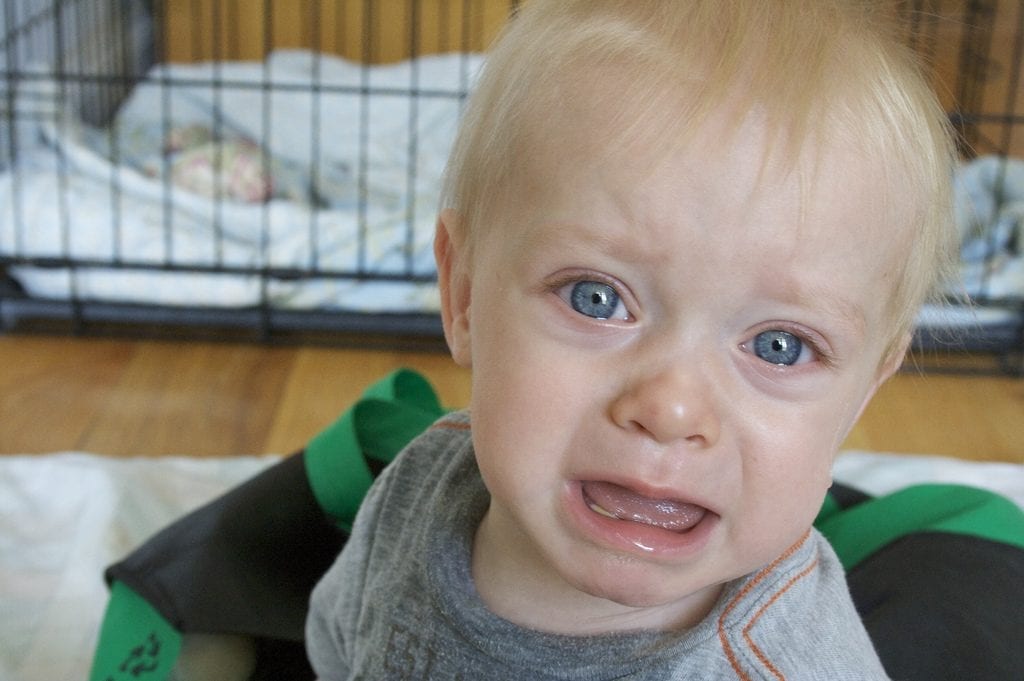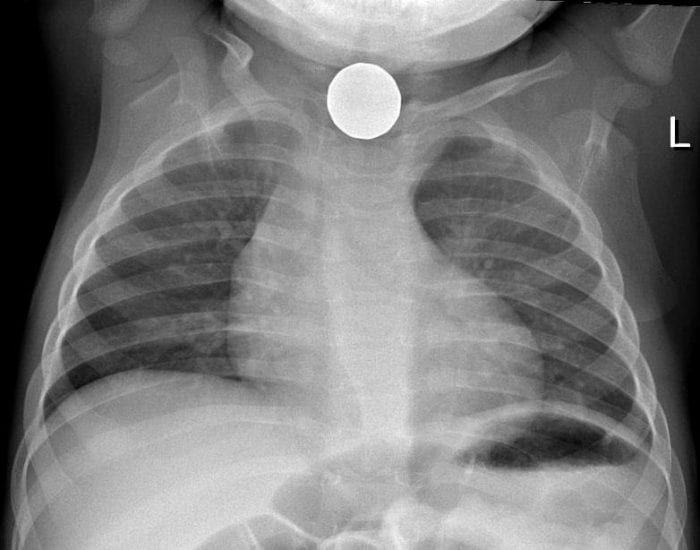Many parents tend to worry, even about the smallest things. Even a slight fever can prompt a doctor’s visit within hours. But when your baby’s breathing seems off, your concern is warranted. It might be stridor. Let’s find out about stridor sound, its causes, and how you can address it. Is stridor life-threatening? Or alarming? Your child might need special medical attention for it.

What Is Stridor?
Also called extrathoracic airway obstruction and musical breathing, it is breathing that is unusually noisy. It is a high-pitched, wheezing noise. It may also vibrate like a low whistle that is loud enough to hear without the aid of a stethoscope. It is usually a sign of a narrowing of the child’s airway. Check for audio examples of a stridor sound.

Types Of Breathing
- Inspiratory – This is when you only hear the noise as your child inhales. Inspiratory means there is a problem with the area or soft tissue above the vocal cords.
- Expiratory – Unlike the previous type, you only hear stridor when your baby exhales. Expiratory indicates that something is blocking the windpipe.
- Biphasic – This is a combination of the previous two. With biphasic stridor, you can hear the noise when your child both inhales and exhales. Biphasic means that there is a narrowing of the cartilage near the vocal cord.
Stridor Causes
There are several causes of stridor. Here are the most common causes.

- Laryngomalacia – This is a congenital condition that is the most common culprit of stridor breathing in infants and young children. Here, the tissues of the larynx or voice box soften, and the soft tissues start blocking the child’s airway. (check the Healthline page for more details).
- Foreign body – Babies can be curious. Because of this, a small object may become lodged in your child’s throat, airway, or nose. If this is the case, the stridor sound is often temporary. Stridor typically goes away once you remove the object. To avoid this, don’t let your child put things in their mouth.
- Inflammation – Musical breathing can also occur from inflammation of the airway, throat, or lymph nodes. It may be due to an infection, an allergic reaction, croup, bronchitis, epiglottitis, and even tonsillitis. Croup is the leading cause of acute stridor.
- Trauma – Trauma to the airway or vocal cords can also lead to noisy breathing. Stridor can be from a throat surgery or an accident leading to a fracture in the neck.
- Harmful substances – Inhaling smoke and swallowing chemicals that can damage the throat and airway are some other causes.
Dangers Of Stridor
How dangerous these breathing sounds will depend on their cause. Generally, you should see a health professional if you hear your child experiencing this. If you can observe the mentioned symptoms in your infants, they should be checked by medical experts. This turbulent noise indicates that there is a blockage in the child’s upper airway, and stridor occurs.

Some cases of stridor are considered medical emergencies and need immediate care. For instance, if there is something lodged in your child’s throat and causing them to choke, immediate care and attention must be given to the child. Allergies leading to anaphylaxis also require urgent care. Other instances of inflammation may also be life-threatening as they can lead to respiratory failure.
Important signs to look out for include nasal flaring, bluish lips or skin, difficult or strained breathing, lethargy, and weight loss. A physical exam by a healthcare professional is essential to ensure stridor is diagnosed correctly.
Laryngomalacia is a different case, however. It’s common and rarely life-threatening. It often becomes noticeable in infants around 4 to 7 months of age. Most kids outgrow this by the age of 2, and it rarely requires medical attention. However, if left untreated, some cases may need intervention in an operating room.
What Is Stridor Treatment?
For stridorous breathing, your child may need medical treatment. Your physician or pediatrician may perform one of the following to get the stridor treated:

- They may refer you to a throat or nose specialist.
- Provide an injection or oral medicine for allergies or inflammation in general.
- Hospitalize and monitor your child. In severe cases, performing surgery may be necessary for the child’s treatment (rare cases).
Conclusion
Call your doctor if you hear this kind of breathing. Even if stridor runs in the family, you likely won’t know its cause. Ask your doctor about it and other medical concerns. Different breathing noises from your kids mean different things. It’s worth noting that not all noisy breathing can be equally scary. Some can even be resolved on their own. However, every so often, these noises point to a serious condition. Better safe than sorry. Speech pathologists may also be involved in the treatment if the stridor is affecting the child’s speech development, especially if it’s in the intrathoracic region.
Frequently Asked Questions (FAQs)
What Makes A Stridor Emergency?
Yes, children’s hospital ear, nose, and throat doctors say that it can be considered an emergency that requires immediate medical attention. It occurs due to laryngeal stridor or tracheal obstruction in children’s airways that may eventually lead to vocal cord problems or chest cavity collapsing if the underlying cause is not detected early.
What Is The Most Common Cause Of Stridor In Children?
Foreign body aspiration, congenital disorders, and infections that cause inflammation in the airways are the most common causes of stridor in children.
Is Stridor Life Threatening?
Yes, the condition can be life-threatening when a healthcare provider cannot diagnose it at once. The reason is that your child’s windpipe or voice box may continue swelling to the extent that they can hardly breathe.
What Are The Markers Of A Stridor Cough?
Stridor usually comes after croup coughing, which makes a kid sound like a barking seal. When they inhale, the high-pitched noise from their trachea or larynx can be heard, as if they have trouble breathing.
What Is Stridor Breathing Usually A Sign Of?
A stridor is a sign of a blockage in a child’s trachea or larynx. Stridor usually sounds like a high-pitched wheezing noise, unlike the ‘typically low-pitched’ sounds often heard in cases of bronchial obstructions or certain respiratory illnesses.
What Is The Difference Between A Wheeze And Stridor Breathing?
A wheeze is a continuous sound that comes from the lungs when the upper airway walls are narrow. Stridor, meanwhile, is comparable to a loud musical noise that comes from the larynx or trachea — similar to a child breathes labored breathing when dealing with a viral infection.
How Do You Treat Stridor Breathing?
Stridor can be treated by taking injections or medications to reduce airway blockage and swelling. In severe cases, doctors may suggest surgery.
When Should I Be Concerned About My Child’s Breathing?
Parents should be concerned about a child makes breathing when the high-pitched noise is louder than ever. Take the child to the doctor immediately (specifically a throat specialist) if that occurs or your child has been ill recently.
Does Stridor Go Away On Its Own?
Yes, stridor can go away on its own before kids even become adults. However, stridor does not always happen, especially if it’s a result of a congenital disorder.
How Do You Treat This Kind Of Breathing At Home?
Turning on a humidifier at home may reduce the swelling in the larynx or trachea. Your child should also be allowed to play outside when it’s cold since the cold air may be helpful.
Can Stridor Be Caused By Allergies?
Yes, allergies can cause stridor, primarily when it’s severe. The inflammation can make the throat swell, thus allowing air to pass through as a wheezing sound.
How Do You Identify Stridor Breathing Or Sound?
Stridor breathing is identified during a physical examination by a healthcare provider, often characterized by what is heard as a high-pitched sound when the child breathes.
Does Stridor Breathing Mean My Child Has Asthma?
Stridor breathing does not necessarily mean your child has asthma. What is important is to consult a healthcare provider for a proper medical history and diagnosis.
Does Stridor Get Worse When Lying Down?
Yes, stridor breathing can get worse when lying down, as it may indicate that the airway is partially blocked.
Does Vicks Help Ease Stridor Noisy Breathing Sounds In Children?
Using Vicks is not typically recommended for easing stridor breathing in children. It’s best to consult a healthcare provider for appropriate stridor treatment.
How Can A Blockage In The Voice Box Or Swelling Near The Vocal Cords Lead To Stridor Breathing In Children?
Last Updated on May 13, 2023 by Bernadine Racoma
DISCLAIMER (IMPORTANT): This information (including all text, images, audio, or other formats on FamilyHype.com) is not intended to be a substitute for informed professional advice, diagnosis, endorsement or treatment. You should not take any action or avoid taking action without consulting a qualified professional. Always seek the advice of your physician or other qualified health provider with any questions about medical conditions. Do not disregard professional medical advice or delay seeking advice or treatment because of something you have read here a FamilyHype.com.